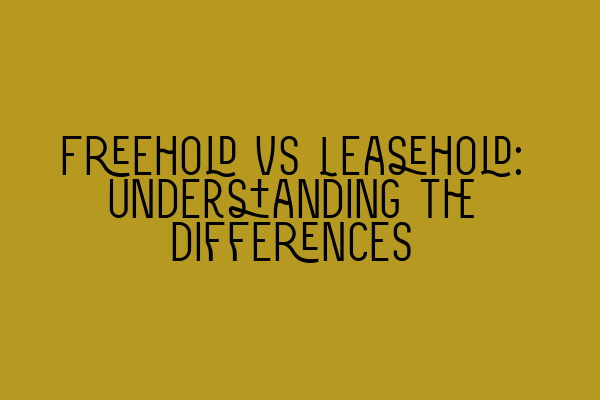Freehold vs Leasehold: Understanding the Differences
When it comes to property ownership, one of the key distinctions to be aware of is the difference between freehold and leasehold. Understanding these concepts is essential for anyone involved in the property market, whether you are buying or selling a property or dealing with property-related issues as a legal professional. In this blog post, we will delve into the details of freehold and leasehold, highlighting their differences and their implications in the real estate world.
Firstly, let’s clarify what freehold and leasehold mean:
1. Freehold:
Owning a freehold property means having absolute ownership of the property and the land it stands on. This type of ownership typically lasts for an indefinite period, allowing the owner to make their own decisions regarding the property’s use, upkeep, and potential alterations. Freehold properties are not subject to ground rent or lease agreements.
2. Leasehold:
Leasehold ownership, on the other hand, grants the right to occupy a property for a fixed period of time through a lease agreement with the freeholder. The leaseholder has certain rights and obligations outlined in the lease, which can include paying ground rent, service charges, and obtaining consent for certain alterations. The leasehold ownership eventually expires, and the property returns to the freeholder.
Now that we have defined the basic concepts let’s explore the differences between freehold and leasehold:
1. Ownership:
As previously mentioned, freehold ownership grants absolute ownership of the property, while leasehold ownership is more akin to a tenancy agreement. In leasehold, the leaseholder is essentially a tenant with a contractual agreement with the freeholder for a specific time period.
2. Duration:
Freehold ownership is typically perpetual, meaning there is no predetermined duration, whereas leasehold ownership has a fixed term agreed upon in the lease. Lease durations can vary significantly, from a few years to several centuries, with long leases commonly seen in commercial properties.
3. Control:
Freehold owners have complete control over the property, including decision-making powers regarding alterations, renovations, and usage of the property. Leasehold owners, however, have certain restrictions and obligations outlined in the lease agreement, often requiring consent from the freeholder for substantial changes.
4. Responsibilities:
Freehold owners bear full responsibility for the maintenance and repair of the property. Conversely, leasehold owners may have obligations to contribute to the maintenance and repair costs through service charges and ground rent. These charges cover the upkeep of communal areas and the building’s exterior, among other things.
5. Ground Rent and Service Charges:
Freehold properties are not subject to ground rent, whereas leasehold properties usually require the leaseholder to pay an annual ground rent to the freeholder. Additionally, leasehold properties may incur service charges for the maintenance and operation of shared amenities, such as gardens, security, or common parts.
6. Value and Resale:
Freehold properties are generally perceived to hold higher value and sell more easily than leasehold properties due to the potential complexities associated with leasehold ownership. Leasehold properties may also have restrictions on subletting or selling the property without obtaining the freeholder’s consent.
7. Repossession:
In extreme cases of non-compliance with the lease terms, the freeholder may possess the right to repossess a leasehold property. Freehold properties do not face such risks unless mortgage or legal issues arise.
Understanding the differences between freehold and leasehold is crucial for property buyers, sellers, and legal professionals working in property law. Each type of ownership has implications for property’s value, management, and future transactions. It is recommended to seek professional advice before engaging in any property transaction to ensure a clear understanding of the rights, responsibilities, and potential limitations associated with the chosen type of ownership.
To learn more about property law, prepare for the SQE exams, or explore other legal topics, check out our related articles:
– SQE 1 Practice Exam Questions
– SQE 1 Practice Mocks FLK1 FLK2
– SQE 2 Preparation Courses
– SQE 1 Preparation Courses
– SRA SQE Exam Dates
At SQE Property Law & Land Law, we provide comprehensive legal services and expertise to assist you in navigating the complexities of property transactions and related legal matters. Our team of dedicated solicitors is committed to delivering the highest standard of professional service, ensuring your interests are protected. Contact us today to discuss your property law requirements.
